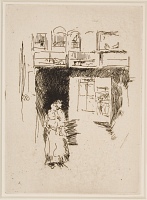Bird Shop - Seven Dials | ||
| Number: | 384 | |
| Date: | 1888 | |
| Medium: | etching | |
| Size: | 135 x 98 mm | |
| Signed: | butterfly at left | |
| Inscribed: | no | |
| Set/Publication: | no | |
| No. of States: | 1 | |
| Known impressions: | 8 | |
| Catalogues: | K.281; M.276 | |
| Impressions taken from this plate (8) | ||
KEYWORD
baby, woman standing, bird, birdcage, , shop, street.
TITLE
Variations in the title are as follows:
'Bird Shop' (1888, Whistler). 2
'Birdcages / Drury Lane' (1888/1890s, Whistler). 3
'Bird Shop - Seven Dials' (1890/1892, Beatrice Whistler (1857-1896)). 4
'Bird-Cages, Drury Lane' (1902, Edward Guthrie Kennedy (1849-1932)). 5
The title 'Birdcages Drury Lane' could be confused with Drury Lane 243 and with the lithograph Drury Lane Rags c025. Whistler's original title 'Bird Shop' could be confused with Bird-Cages, Chelsea 297, which is a similar subject. Beatrice Whistler's more site-specific title, 'Bird Shop - Seven Dials', is therefore preferable.
'Bird Shop' (1888, Whistler). 2
'Birdcages / Drury Lane' (1888/1890s, Whistler). 3
'Bird Shop - Seven Dials' (1890/1892, Beatrice Whistler (1857-1896)). 4
'Bird-Cages, Drury Lane' (1902, Edward Guthrie Kennedy (1849-1932)). 5
The title 'Birdcages Drury Lane' could be confused with Drury Lane 243 and with the lithograph Drury Lane Rags c025. Whistler's original title 'Bird Shop' could be confused with Bird-Cages, Chelsea 297, which is a similar subject. Beatrice Whistler's more site-specific title, 'Bird Shop - Seven Dials', is therefore preferable.
2: Whistler to Wunderlich's, 29 June 1888, GUW #13052.
3: Written on ).
4: List, GUW #12715.
5: Kennedy 1902[more] (cat. no. 289).
DESCRIPTION
In the left foreground stands a woman holding a baby, just outside a dark, low, rectangular passageway through to another street. Above the opening hang two rows of bird-cages, some containing birds. A double door, and a woman, are just distinguishable in the distance.
SITE
Both Drury Lane and Seven Dials are within the area of Covent Garden, London. It is now thought of as the centre of London theatre-land. However, Seven Dials was described in Dickens's Dictionary of London:
'celebrated as the heart of one of the poorest districts in London.... The readiest approach to it is from St. Martin’s-lane, crossing between Cranborne-street and Long-acre. Turning up northwards here, the stranger finds himself in a street altogether unique in its way. It is the abode of bird-fanciers. Every variety of pigeon, fowl, and rabbit can be found here, together with rare birds, such as hawks and owls, parrots, love-birds, and other species native and foreign. ... Others are devoted to British song-birds, larks, thrushes bull-finches, starlings, blackbirds, etc. Here and there are shops filled with cages of all kinds and sorts ... Passing through this lane we are in the Dials, a point where seven streets meet.'
6
As an example of the local speciality, one bird-cage maker in Seven Dials was John Sabin, who had his shop at No. 1 West Street (on the north side of the street, which ran between 18 Tower Street and 9 St Martin's Lane). 7
7: Post Office Directory, London, 1888.
DISCUSSION
Whistler etched a similar subject on a larger scale in Bird-Cages, Chelsea 297, which was probably etched shortly before Whistler's marriage to Beatrice Whistler (1857-1896). Beatrice was a designer, and many of her designs for tiles and furniture panels included birds. 8
8: Glasgow 1997, pp. 26-31, cat. nos. 8-14, 53-55.
